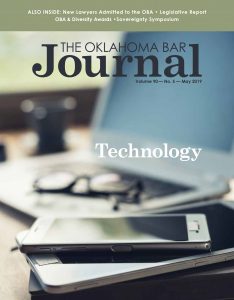Oklahoma Bar Journal
May 2019 | Technology

Feature Articles
Text Messaging for Lawyers
Text messaging (or texting) is one of the technology advances that has impacted how most people interact with each other. Like many consumer technology tools, texting can be a time waster, but sometimes it is the absolute perfect tool. When you’re running late for a social meeting, a quick text of “OTW” or “B there in 5 min” relieves stress for both parties.
Is Virtual Reality the Future of Courtrooms?
Virtual reality (VR) has made a splash the last few years in the video and gaming markets. People can strap on an Oculus Rift or HTC Vive and feel like they’re stepping into another reality. You can go on a roller coaster, swim with sharks or visit a haunted house. However, in the last few years VR has started to make its way into courtrooms as well.
The Ethics of Using Cloud-Based Services and Products
In 2012, the ABA’s House of Delegates voted to amend Comment 8 to Model Rule 1.1 regarding competence to provide that to “… maintain the requisite knowledge and skill, a lawyer should keep abreast of changes in the law and its practice, including the benefits and risks associated with relevant technology …”1 Since the amendment, 36 states, including Oklahoma,2 have adopted some form of Comment 8 or an equivalent3 and a great deal has been written and blogged about what technology competence really means.4
When Elephants Collide
The trumpet for technological competence in legal practice has sounded. Gone are the days when electronic research, filing, pleading, discovery software and tech-filled trials were phenomena – all those are now an indispensable part of modern practice. Gone too are the days when lawyers could turn a blind eye to those technological developments.1 The rules of legal ethics now make it an ethical requirement for lawyers to become familiar with relevant technological advances affecting their practices.2 For added measure, courts in Oklahoma have shown themselves willing to discipline lawyers who fall short.3 The rules do not, however, give specific guidance on the scope of what is “relevant” for the purposes of satisfying technological competence. In the specific context of discovery, for example, does this mean that a lawyer’s duty of electronic competence is gauged by prevailing norms in a given practice area or by the locale in which the attorney maintains her practice? Relatedly, early guidance in 2007 and 2008 from the Alabama, Arizona and New York bar advisory ethical opinions suggested that lawyers should “scrub documents” of metadata before disclosing to opposing counsel.4 Oklahoma has not taken a position on the issue, and as we outline below, with good reason.
Do Attorneys Dream of Electronic Wills?
Ours is an increasingly digital society. In fact, you can live almost your entire life online. You can have a career, travel to faraway places, build and maintain relationships and generally transact most of your day-to-day business – all without leaving the comfort of your computer chair. These technological advancements have even trickled down to the often slow-to-adapt legal profession. Contracts are negotiated and executed online. Deeds and other conveyancing instruments are recorded online. Entire practice areas have emerged to manage digital assets, digital privacy, digital advertising and other innovations spawned by the internet of things.
Plus Articles
Make Time to Submit a Nomination
The time of the year is upon us to again take the time to recognize deserving individuals and groups who serve our community through their leadership, their service to the public and their service to the legal profession. This is the real beginning of the OBA Awards year, and the real work of the OBA Awards Committee starts now with publicizing the nomination process.
Diversity Awards: Nominations Due July 31
The Diversity Committee is now accepting nominations for the Ada Lois Sipuel Fisher Diversity Awards to be presented in October. The three award categories are members of the judiciary, licensed attorneys and organizations that have championed the cause of diversity. All nominations must be received by Wednesday, July 31.
